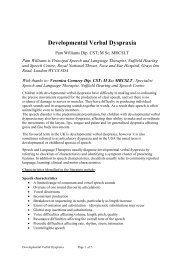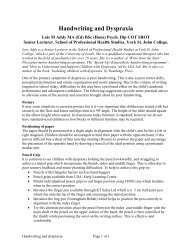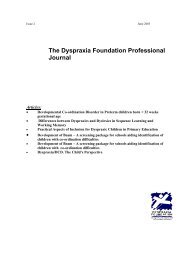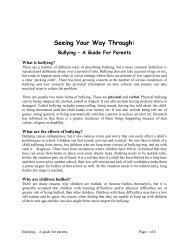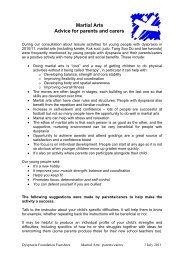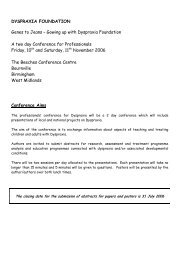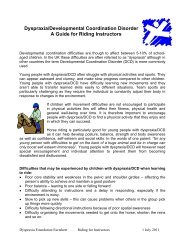Employers Guide - Dyspraxia Foundation
Employers Guide - Dyspraxia Foundation
Employers Guide - Dyspraxia Foundation
Create successful ePaper yourself
Turn your PDF publications into a flip-book with our unique Google optimized e-Paper software.
<strong>Dyspraxia</strong> <strong>Foundation</strong> <strong>Guide</strong> For <strong>Employers</strong><br />
return files to where they came from<br />
• Thinking and ideas can be<br />
organised with Mind Maps, Spider<br />
Diagrams or Flow Charts.<br />
• Talk through ideas with individual in<br />
order to clarify their thinking.<br />
• Ask individual to make calls rather than<br />
receive them so they are prepared<br />
before the call e.g. jot down points<br />
before hand use a special note book.<br />
• Give plenty of warning regarding<br />
deadlines.<br />
• In the early days of a new job setting<br />
a well structured plan for each day will<br />
help establish pattern<br />
Case Study: Tom<br />
The work Tom produced, although erratic, was<br />
of a high standard and his patches of<br />
brilliance were appreciated by his line<br />
manager who had worked with him for several<br />
years.<br />
When a new line manager, Chris, came into<br />
the post, he found Tom’s attitude to be laissezfaire.<br />
His time keeping, untidy desk and<br />
personal appearance were not the image<br />
the new manager wanted for his section.<br />
Tom was challenged by Chris’s expectations<br />
and fear began to affect the standard of the<br />
work he produced. Tom felt that the new<br />
line manager was getting at him and Chris<br />
felt that Tom was a “passenger”. Tom had a<br />
warning about his time-keeping and started<br />
not coming into work.<br />
The Human Resources department became<br />
involved and Tom acknowledged that his<br />
lack of organisational skills affected not only<br />
his work life, but also his private life. He found<br />
it hard to organise his living space, money,<br />
shopping, washing etc. He knew his personal<br />
appearance, hygiene and communication<br />
style were a challenge to his working<br />
colleagues. He was worried about money<br />
and was now terrified he would lose his job.<br />
Tom was referred to an occupational therapist<br />
who recognised that he had dyspraxic/<br />
Asperger Syndrome tendencies.<br />
Tom found it useful to have a diagnosis for his<br />
difference and felt that he had a parameter<br />
of understanding that he could do something<br />
about. The conditions were discussed with<br />
the line manager and a game plan and<br />
programme of intervention was organised.<br />
Tom did not wear a watch as he found it<br />
Produced by Key 4 Learning Ltd



